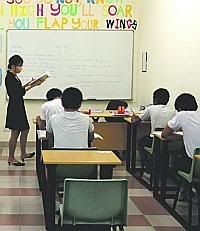The Straits Times, Singapore, 20 November 2006
Boys' Home: When some don't make good
Three in 10 go back to crime; experts divided on whether this figure is acceptable
By Tanya Fong and Yap Su-Yin
(extracts)
SECOND CHANCE: For some inmates, the Boys' Home offers a structured environment to take up studies or vocational courses.MARIA Dass Pandi Rasan spent two stints at the Singapore Boys' Home.
He was 11 the first time he was sent there for shoplifting. He was there again in 2004 for two years for a similar offence. At 16, he was in court again on Nov 6, for robbing two cabbies at knife point and hurting one of them.
This time, he was sentenced to five years' jail and 24 strokes of the cane. [Caning sentence later overturned on appeal - C.F.]
What makes a young person go back to crime despite efforts to keep him from eventually spending time in jail?
At the Boys' Home, Dass falls into the 30 per cent who fail to turn around despite counselling and educational programmes and a disciplinary regime.
His mother, Madam S. Indrah, a 35-year-old cleaner, blames the Boys' Home for making her bad son worse.
She said: 'It was there he met people who made him turn violent. He would never have been like that if he had not been to the Boys' Home.'
His home life tells its own story. His father's whereabouts are unknown. He and his younger sister, now 14, lived with their mother in their grandparents' three-room flat in Taman Jurong. He dropped out of school in Primary 2.
To the Ministry of Community Development, Youth and Sports (MCYS), boys like Dass present a challenge.
Miss Ang Bee Lian, director of rehabilitation and protection, said turning around boys from broken homes who have a long history of delinquency takes time.
She said: 'They have a range of emotions and issues that need to be sorted out. These require time, space and patience. They also need support from their family and school to be reintegrated.'
The Boys' Home and its hostel in Jurong West house about 380 boys aged from nine to 19 sent there by the courts to serve two- or three-year stints.
So far, MCYS has tracked only those who entered the Boys' Home between 1997 and 2001 - to see if they remain crime-free for at least three years after they leave the home.
It found that the re-offending rate was an average of 30 per cent.
[...]
Dr Carol Balhetchet, director of youth services at the Singapore Children's Society, said there will always be some boys who emerge from the Boys' Home even more aggressive, and who will have 'contaminated' others too.
She thinks a 30 per cent recidivism rate is 'not ideal but not so bad'.
Given her experience counselling boys who tell her being in the home is 'no problem', she thinks the regime should, in fact, be tougher.
She said: 'Just the thought of Boys' Home should put the fear in them, not give rise to the cocky responses we seem to be getting now.'
Twelve ex-residents of the Boys' Home who spoke to The Straits Times agreed, saying its disciplinary regime was too lax. Although policing measures include round-the-clock supervision by Cisco guards and use of surveillance cameras, fights and bullying occur daily.
Two of the 12 went back to crime after they left the home.
Alex, now 18, was caught sniffing glue and sent there in 2002 for two years. Last year, he started abusing ketamine and took part in a gang fight. His case is pending.
Kumar, now 20, was in the home from 1999 to 2002 for theft and housebreaking. He reckons he was caned over 60 times for getting into trouble, mainly because of fights. After he got out, he landed in the Reformative Training Centre for two years for rioting.
Said Kumar: 'Being inside the home made me more aggressive. Even when you don't want to fight, people still challenge you.'
When asked to comment on the specific types of bullying claimed by former residents, including sexual offences, MCYS said it takes 'a stern view' of such offences.
There is an average of two such incidents per month. Perpetrators are dealt with severely. Punishment includes caning and cancellation of home leave.
For ex-resident Adrian, now 20 and studying aeronautical engineering in a polytechnic, the Boys' Home turned his life around.
It offered him a structured environment with group work sessions to set goals and manage anger, and take up studies or vocational courses such as computer skills training.
Placed there for a year in 2001, he took the chance to study for his N levels. He scored four As and one B.
[...]

